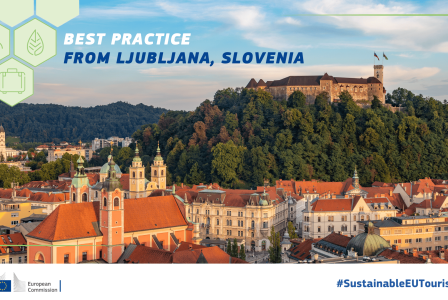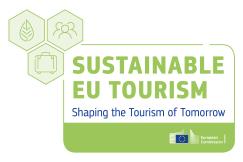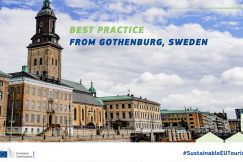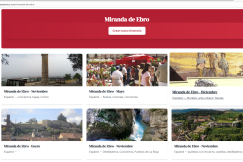Best practices
31 July 2025
Sustainable EU Tourism project - best practice: Ljubljana
Best practices
31 July 2025
Cultural tourism
Gastronomy tourism
MICE tourism
+10 more
Login / create an account to be able to react
-
32

Ljubljana, Slovenia, embarked on digital and sustainable transformation by leveraging new technologies in tourism to create personalised experiences, targeted marketing, efficient crowd management, and smarter use of resources
Sustainable EU Tourism project
Topics
Slovenia
Destination Management & Marketing Organisations
-
Specific types of tourism
-
-
Cultural tourism
-
Gastronomy tourism
-
MICE tourism
-
Urban/city tourism
-
-
Transition Pathway Strategic Areas
-
-
Accessible tourism services
-
Best practices, peer learning and networking
-
Digitalisation of tourism SMEs and destinations
-
Governance of tourism destinations
-
Green Transition of Tourism Companies and SMEs
-
Innovative tourism services
-
R&I on digital tools for tourism
-
Sustainable mobility
-
-
Business activities
-
-
Other
-
Share
Ljubljana, Slovenia, has been recognised as a best practice by the Sustainable EU Tourism project for its innovative integration of digital tools to enhance visitor experience and promote sustainable urban tourism.
Driven by a long-term smart city vision, Ljubljana has introduced a wide range of digital services to facilitate green mobility, accessibility, and visitor engagement. Since 2013, apps like Tap Water, Nexto, and Ljubljana by Wheelchair have offered solutions to promote sustainability and inclusiveness. The URBANA smart card and app consolidate transport and tourist services into a single platform, while the Ljubljana Tourist Card (integrated in 2023) further streamlines access to major attractions.
In addition, the city launched a digital map featuring nearly 600 curated points of interest, allowing personalised itineraries. In these regards, the digitisation of Plečnik’s architectural heritage has preserved cultural assets through immersive technology.
Additionally, smart waste solutions, including solar-powered Bigbelly bins and the Ljubljana Regional Waste Management Centre, demonstrate the city’s commitment to managing tourism-related environmental impacts.
Innovation is further fueled by tech labs and VR/AR environments that connect tourism with research and entrepreneurship.
Ljubljana’s approach illustrates how cities can foster digital innovation to boost sustainability, accessibility, and visitor satisfaction.
For more details on the key challenges the destination has faced, and the solutions implemented to address them, please refer to the attached document.
Documents
Comments (0)
Related content
See also
Sustainable EU Tourism - Key challenges and best practices
- Categories
- Coastal, maritime and inland water tourism Cultural tourism Ecotourism +64 more
Platform for creating accessible and multilingual itineraries with voice assistant
- Categories
- Coastal, maritime and inland water tourism Cultural tourism Ecotourism +64 more
Sign-up for the Sustainable EU Tourism Twinning Workshop
- Categories
- Coastal, maritime and inland water tourism Cultural tourism Ecotourism +64 more





